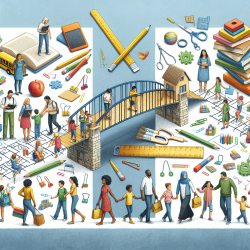Introduction
In the realm of speech-language pathology and child development, the interplay of various forms of capital—cultural, economic, and social—can significantly influence children's health outcomes. A recent study titled Capital interplays and the self-rated health of young men: results from a cross-sectional study in Switzerland sheds light on how these factors contribute to the self-rated health of young Swiss men. As practitioners, understanding these dynamics can enhance our approaches to fostering better health outcomes in children.
The Study: An Overview
The study conducted by Veenstra and Abel (2015) explores how parental cultural, economic, and social capitals, along with personal educational streams, impact the self-rated health of young Swiss men. Utilizing data from a large cross-sectional survey, the study reveals that parental education, economic status, and social connections significantly influence the health perceptions of their sons.
Key Findings
- Parental Education: Sons of parents with higher educational attainment reported better health outcomes. This suggests that parental education may provide a foundation for better health practices and access to resources.
- Economic Capital: Family economic circumstances were a crucial mediator in the relationship between parental education and children's health. This underscores the importance of economic stability in promoting healthy lifestyles.
- Social Capital: Parental ties to influential individuals were associated with better health outcomes in their children, indicating that social networks can provide additional resources and support for health.
Implications for Practitioners
For speech-language pathologists and educators, these findings highlight the importance of considering the broader socio-economic context of the families we work with. Here are some actionable insights:
- Encourage Parental Involvement: Engage parents in educational activities and workshops that emphasize the importance of their role in their child's health and education.
- Address Economic Barriers: Advocate for resources and support systems that alleviate economic pressures on families, enabling them to focus on their children's health and education.
- Leverage Social Networks: Facilitate connections between families and community resources, enhancing their social capital and access to health-promoting opportunities.
Encouraging Further Research
While this study provides valuable insights, it also opens avenues for further research. Practitioners are encouraged to explore how these findings can be applied in different cultural contexts and how interventions can be tailored to maximize the positive impact of parental capitals on children's health.
To read the original research paper, please follow this link: Capital interplays and the self-rated health of young men: results from a cross-sectional study in Switzerland.










